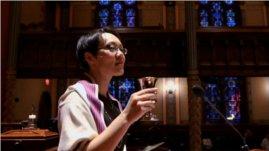Teachers' Domain - Digital Media for the Classroom and Professional Development
User: Preview

Source: Finding Your Roots: "Rick Warren, Angela Buchdahl, and Yasir Qadhi"



NARRATION: Rabbi Angela Buchdahl serves as cantor at New York's prestigious Central Synagogue-she is the first Asian American to be invested as a cantor and the first Asian American to be ordained as a Rabbi in all of North America.
Angela was born in Seoul, South Korea on July 8th 1972 to a Jewish American army veteran and a Korean Buddhist mother. Angela told me that as she grew up in Tacoma, Washington, where they moved when she was five, she often felt conflicted about her identities as an American, a Korean, and a Jew.
Though raised in the Jewish religion, it was during a trip to Israel as a teenager when she was forced to confront the "authenticity" of her religious beliefs. How could a person who looked like her, someone demanded, be genuinely Jewish?
RABBI ANGELA BUCHDAHL: I felt so rejected by the larger Jewish community. I’d had a lot of people say to me, you’re not really Jewish. I remember I called my mother from Israel. I couldn’t even speak for the first few minutes because I was just weeping so hard. And I said, “That’s it, I think I’m going to just not be Jewish anymore. I’m going to stop.” I don’t have a Jewish name. Look at me, I don’t have a Jewish face. I could just stop being Jewish and nobody would ever know. And my mother said, “Is that really possible?” And I realized I couldn’t shed my Jewish identity any more than I could shed being a woman or being Korean. It might not be as evident on my face but it was, not just a part of my DNA, but it was the way I looked at the whole world. It was…it was who I was.
HENRY LOUIS GATES, JR.: Hmmm.
BUCHDAHL: In, in every fiber of my being. I came back from that summer and I said, “I want to be a rabbi.”
NARRATION: Last year, Angela made "Newsweek's" list of the 50 most influential Rabbis in America, and she is one of the rising stars in the Reform Movement.
 Loading Standards
Loading Standards